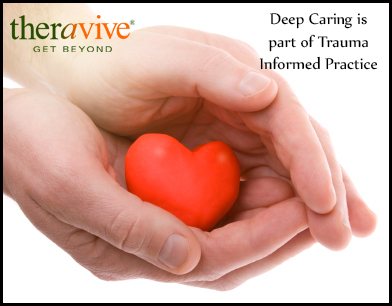 Understanding, Commitment, and Practice
Understanding, Commitment, and Practice
In the last blog, “Trauma Informed Care; The Details of Care”, the risk and protective factors were named and highlighted closing with the statement that Trauma informed care involves the closely interrelated triad of; understanding, commitment, and practice.
These must be organized around the goal of successfully addressing the trauma based needs of those receiving services. Starting with the concept of understanding, one must create a detailed and comprehensive understanding of Trauma by looking at the following areas to create a holistic picture:
1. The trauma - “Because it changes the rules of the game…”
2. The child - Within a context because the child will try as attempts to cope with intolerable circumstances”
3. The services - With the goal of returning a sense of control and autonomy through strengths based vision
4. The relationship - “Must be delivered in the context of a relationship”
Next, one must evaluate the values that differential trauma informed services from traditional services (Hodas, 2006, pg 34)
1. Power and control – empowerment versus management and control
- Asking permission
- Talking about choices – choices open space versus closing it.
- Preparing conversations
- The types of questions that are being asked
2. Authority and responsibility – psycho-education versus expert interventions
- Gives the person the ability to think critically and therefore allowing the thought is allowing the power back in their hands
- Non invasively allowing connection to the past to create new coping for the future
3. Goals
- Growth and change
- Something to reach for
- When I am sitting with a young person I am always looking at them and listening to hear pieces that would give me a vision for the future.
4. Language
- Is your language intentional or not? Have you paused before using it to ask what it would mean if you said it out loud?
- Does the language support the necessary context for healing? Does it; respect, empower, give choice, offer ideas, dignify?
“ A respectful approach to a child increases that child’s sense of safety and security. And thereby increases the likelihood of openness to input and subsequent internal reflection. Shaming solidifies the child’s defensiveness and externalizes the issue into an interpersonal conflict (Hodas, 2006, pg 40)”
 Trauma informed practice and deep caring
Trauma informed practice and deep caring
Some of my first clients that came to the farm at Shamrock Counselling had a huge list of diagnosis and behaviors. It was hard not to pay attention to the common story lines of their adoption from orphanages, organic brain damage from all the forms of neglect you could imagine, violent behaviors at home and at school, extreme addiction issues and possible bi polar diagnosis just to name a few. However, despite all the trauma stories that I could focus on, I chose, consciously, to focus on the number one truth that I hold about Trauma counselling to this day – where I can find threads of deep caring in their lives. This helped me focus and kept me curious about the alternative stories of these young people, and also what THEY wanted in their lives for health and happiness.
A learning of what deep caring is can come from many places. Maybe from your family during special moments at Christmas, maybe in a friend who called you and told you that they believed in you when you felt no one else did, perhaps when you learned to take care of a new kitten or puppy and the joy they returned to you. Even though deep caring is all around us, there was an influential book in my life that offered ways to talk about this concept. The book was called, “The Satire Model” by Virginia Satire. In the book she made it possible to describe deep caring, as it is not a thinking situation, it is a feeling situation. It is a knowing of yourself and allowing a connecting that moves from the physical, emotional, mental and into a realm of spiritual relationship with yourself and others.
This may let you in a little bit about how I work and I do believe that the feeling has to come first. You may now drift off in your heads to think about some of the wonderful young people that you have worked with over your time being a teacher or youth worker or mother or father... And I am sure that each one of you KNOW that there is a detector within us all that calls out when we think people are lying, not being congruent, or hiding something. Young people are great at using this to call you out when you do not have deep caring. So thinking your way to deep caring probably won't work for long. There are also different ways that you can be told that the connection is not working; they don’t come back, they are silent, or violent.
Summing up the four-blog series introducing Trauma Informed Care I have touched upon a number of different topics and concepts that I hope can invite anyone reading to investigate further into what it means to you. Some of the pieces that I hope will be useful are; the forms of therapeutic theories that I use in practice, the concept of solidarity, looking at Trauma as not an isolated incident but what its effects are on a daily basis, and the idea that we can learn how to cope with Trauma from horses, animals and nature.
Cristina works in Abbotsford BC and is the creator of both Shamrock Counselling Services (www.shamrockcounselling.com ) & Sundance Solace Society (www.sundancesolace.com). Sundance Solace is a non-profit branch that focuses on the power of nature to benefit people. If you would like to be involved there are a number of opportunities including: professional and practicum internships, associate positions, and volunteering. Please contact Cristina for more information
By Cristina Rennie MA, RCC, CEIP – MH
www.shamrockcounselling.com
shamrockcounselling.cristina@gmail.com
604 751 2354
About the Author

Shamrock Counselling
, MA, RCC, CBEIP, NAEFWShamrock Counselling specializes in a unique style of counselling known as Equine Facilitated Counselling. Clients have the opportunity to work alongside horses in a safe, open and outdoor environment. In addition to Equine Facilitated Counselling, Shamrock Counselling also offers Traditional Counselling at their second location in the heart of Downtown Abbotsford. Shamrock Counselling is made of a team of qualified counsellors with specialization in a large range of different areas.
Office Location:
31050 Harris Rd.
Abbotsford, British Columbia
V4X 1W2
Canada
Phone: 604-751-2354
Contact Shamrock Counselling
Professional Website:
www.shamrockcounselling.com